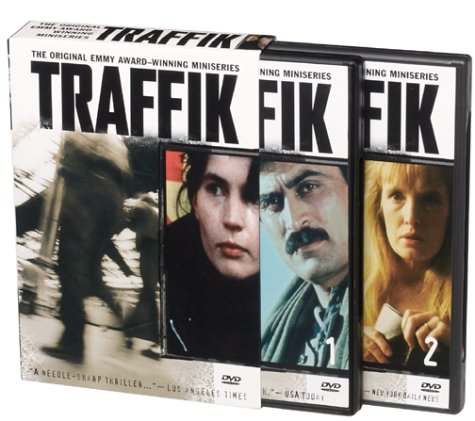First aired in 1989 and running a total of six episodes, Traffik is a British miniseries that takes a look at the War on Drugs.
British minister Jack Lithgow (Bill Paterson) has negotiated a treaty with Pakistan. The UK will send increased aide to Pakistan if the government will crack down on the heroin trade. In theory, it sounds like a good idea. Pakistan will get extra cash while joining the effort to stop the flow of heroin into Europe. In reality, it harms the poor farmers in Pakistan. After soldiers destroy his village’s poppy fields, Fazal (Jamal Shah) is left with no way to support his family. He travels to the city, where he gets a job with drug lord Tariq Butt (Talat Hussain). It’s a job that Fazal has to take in order to feed his family but it’s also a job that puts his family’s safety at risk.
After the heroin in processed in Pakistan, it is smuggled into Europe by men like Karl Rosshalde (Juraj Kukura), a German businessman whose company is a front for his operations. When two German police detectives (Fritz Müller-Scherz and Tilo Prückner) arrest Jacques (Peter Lakenmacher), one of Karl’s couriers, it looks like Karl might finally being going to prison. However, Karl’s British wife, Helen (Lindsay Duncan), proves herself to be just a ruthless as he was when it comes to running his operations.
Even with Karl on trial, the drug trade continues. The heroin that is processed in Pakistan and smuggled through Germany eventually ends up in the UK, where it is used to by Caroline (a very young Julia Ormond), the teenage daughter of Jack Lithgow. When Caroline runs away from home, Jack searches the streets and back alleys of London and, for the first time, he starts to understand the futility of Europe’s war on drugs.
If Traffik sounds familiar, that’s because it served as the basis for Steven Soderbergh’s 2000 film, Traffic. When I watched Traffik this week, I was actually surprised to see how closely Soderbergh’s film stuck to the plot of the miniseries. The only difference, beyond shifting the action from Europe to North America, is that Soderbergh replaced the farmer’s storyline with a story involving Benicio del Toro as a Mexican policeman. That’s a bit of shame, actually. Traffic is one of my favorite Soderbergh films but it is a bit cop-heavy. The people who actually do the day-to-day work in the drug trade, as opposed to the drug lords, aren’t really represented in Soderbergh’s film. As the British miniseries shows, people like Fazal end up working in the drug trade not because they’re evil but because they literally have no other choice. It’s either work for someone like Tariq or starve to death.
As I mentioned earlier, Traffic is one of my favorite Soderbergh films. Considering that I usually find Soderbergh’s films to be hit-or-miss, it’s actually kind of remarkable just how effective Traffic is. The original miniseries, however, is superior to the film in every way. Some of that is because the miniseries has six hours to explore its world whereas Soderbergh had to cram a lot of incidents into 147 minutes. Beyond that, the miniseries succeeds because director Alistair Reid takes a straight-foward, no frills approach to telling his story. Even at his best, Soderbergh has a tendency to be a bit pretentious. Even though Traffic deals with real-life issues, it never allows you to forget that you’re watching a film. Traffik, on the other hand, tells its story with an almost documentary-style immediacy. One need only compare the scenes where Bill Paterson searches for Julia Ormond in Traffik to the scenes where Michael Douglas searches for Erika Christensen in Traffic to see not only the differences between Reid and Soderbergh’s style but also to see why Reid’s more gritty style works better for the story that’s being told. Whereas Soderbergh can’t resist framing Christensen with a blonde halo when she’s finally rescued by Douglas, Traffik leaves little doubt that Ormond has been through Hell and that, even if she does eventually beat her addictions, she’ll be carrying the scars of her experience for the rest of her life. Whereas Traffic ended on a note of hope, Traffik ends with the realization that there is no perfect solution.
Traffic and Traffik are both good looks at the destructiveness of both drug abuse and the efforts to treat drug addiction as a crime. Both are worth watching.

Pingback: Lisa Marie’s Week In Television: 7/31/22 — 8/6/22 | Through the Shattered Lens
Pingback: Lisa Marie’s Week In Review: 8/1/22 — 8/7/22 | Through the Shattered Lens